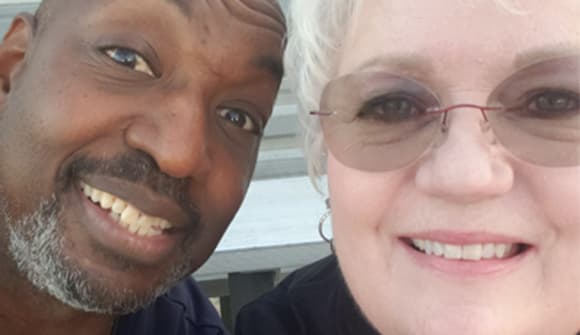Scary start to new year
Fast action after stroke saves father’s life.
Article Date:

New Year's Eve is a time to plan for the future. For 57-year-old Brad Eason, his wife Jill, and his teenage son, Dec. 31, 2021, is memorable for a good reason – Brad has a future due to their fast action.
The family from Ocala, Florida, planned to ring in the new year by getting away from it all in two remote cabins in Waynesville, Georgia. No phones, no cell services. New Year's Eve morning, Eason woke up with a strange feeling on the right side of his head and a headache. He took some ibuprofen and went to sit on the balcony. His wife joined him, and noticed her husband's words sounded muffled.
"Not slurred," she recalled. "It was like he had something in his mouth. I asked him to smile at me. When he did, one side of his face didn't move."
Having been a 911 dispatcher in the past, Jill Eason suspected her husband was having a stroke and wanted to get help immediately. As they reentered the cabin, Eason stumbled.
"I thought I tripped, but my left side was affected. It gave out," he said.
With no phone service, Jill Eason knew she needed to go find help. She called her son, who was staying in a separate cabin with a friend, on the walkie-talkie radios they had brought with them. He came to stay with his father, and Jill Eason took off in the car, stopping at the first house she found. The homeowner called 911. When the ambulance arrived, Eason was taken to Southeast Georgia Health System-Brunswick Campus (SGHS-Brunswick).
Right place for fast treatment
"Fortunately, Brad was taken to a place where they know how to respond quickly to a stroke, and we became involved through the Baptist Health Tele-stroke Network," said Mohamed Chmayssani, MD, neurologist with Lyerly Neurosurgery at Baptist Health and medical director of the Tele-stroke Program.
Tele-stroke virtually connects physicians and health care professionals to the 24/7 expertise at Baptist Health's comprehensive stroke center. The program is utilized by 14 sites within a 160-mile radius of Baptist Medical Center Jacksonville. Dr. Chmayssani is one of 10 Baptist Health tele-neurologists on call for consultation.
At SGHS-Brunswick, Eason was met by Mohsen Akhlaghi, MD, chief of Emergency Medicine, who quickly suspected a possible stroke and made the tele-stroke call.
Because of Jill Eason's quick reaction, and Brad Eason's fast transport to the hospital, he was an excellent candidate for tissue plasminogen activator (tPA), a medication designed to break up clots.
After Drs. Akhlaghi and Chmayssani consulted via video call, reviewed Eason's CT scans and confirmed no bleeding in the brain, Dr. Akhlaghi administered the tPA.
"Only 4% of stroke patients come to the emergency room within the time window to qualify for tPA," said Dr. Chmayssani. "From the onset of stroke symptoms, you only have four and a half hours to be eligible for the treatment. If you present beyond that, the medication is no longer effective and safe. That's why we say 'time is brain.' The faster you get emergency care, the more options there are for treatment and recovery."
In this case, it was only 16 minutes from the time Eason entered the hospital to when the medicine was given, known as door-to-needle time. It's a record for SGHS-Brunswick, and faster than the national standard of 60 minutes.
"That's the beauty of the Tele-stroke Network – it shortens the gap between the specialist consult and the patient's treatment," said Dr. Chmayssani.
When further intervention is needed, the Tele-stroke Network enables fast transport via helicopter to the Stroke Center at Baptist Jacksonville.
Eason was flown to Baptist Jacksonville where Eric Sauvageau, MD, a neurosurgeon with Lyerly Neurosurgery, performed a thrombectomy, a minimally invasive procedure to remove the clot.
New year, fresh start
After a couple weeks in the Intensive Care Unit (ICU), where he was talking and walking within days, and some time in an inpatient rehabilitation center, Eason went home to recover.
His prognosis is good. "They told me I could make a full recovery," he said.
Dr. Chmayssani credits Jill Eason's stroke awareness for her husband's recovery. "She knew he had a stroke and took action right away so he could be treated quickly. That made the difference between him remaining independent, versus relying on his family for the rest of his life. The power of fast treatment is the cornerstone for success."
Be on the lookout
Eason's advice for everyone is to make sure someone in the household is aware of the signs of stroke, and to know your family history. In his case, his mother, grandmother and grandfather had all previously suffered strokes. In addition, he has now been diagnosed with high cholesterol, a common risk factor.
His wife added, "Make sure you have an annual checkup, even if you feel you're too young or healthy to need one."
Time is brain when it comes to stroke. Call 911 if you or a loved one experiences any signs or symptoms of the condition. For more information, go to Baptist Health's Stroke & Cerebrovascular Care page.



